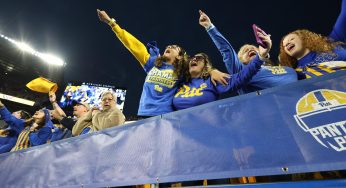Pitt professor says ‘Iron Chef’ isn’t soft
‘ ‘ ‘ Most people who know anything about the hit cooking competition show ‘Iron Chef’ would… ‘ ‘ ‘ Most people who know anything about the hit cooking competition show ‘Iron Chef’ would not be adverse to using adjectives like ‘quirky,’ ‘exotic’ and ‘trippy’ to describe the show. ‘ ‘ ‘ But Dr. Gabriella Lukacs believes that the usage of these terms in reference to ‘Iron Chef’ indicates a fundamental misunderstanding of the show’s history, influence and nature ‘- a misunderstanding she hopes to explain in presenting her critical essay, ‘Iron Chef Around the World: Japanese Food Television, Soft Power, and Cultural Globalization,’ this Friday afternoon. ‘ ‘ ‘ According to Lukacs, an assistant professor in the department of anthropology who teaches courses on global cultural studies and modern Japan, there is an undercurrent in the academic community regarding the influence of shows like ‘Iron Chef’ on Japan’s boom in popularity in the mid-’90s. ‘ ‘ ‘ Many claim that ‘Iron Chef’ and its brethren assert an influence known as ‘soft power,’ a term coined by Harvard scholar Joseph S. Nye in a series of books on international relations. ‘ ‘ ‘ Soft power is the ability of a nation or cultural unit to exert influence over others through cultural or ideological means, rather than ‘hard,’ which refers to things such as military force or economic pressure. In essence, attributing soft power to ‘Iron Chef’ means that it gives Japan influence through the culture and ideology the show portrays. ‘ ‘ ‘ Lukacs disagrees. ‘ ‘ ‘ ”Iron Chef’ does not accrue soft power in the United States, and a look at the history and nature of how American audiences have received it shows why,’ she said. ‘ ‘ ‘ The Fuji Network created ‘Iron Chef’ in the early ’90s in the pursuit of revitalizing the game-show genre. The show was then picked up by San Francisco-based multicultural channel KTSF and from there became a cult hit. Eventually, the Food Network acquired the show in an effort to diversify the channel’s lineup and freshen its image. ‘ ‘ ‘ From there, it became a well-known cultural phenomenon, catalyzing the creation of an American counterpart, ‘Iron Chef America.’ ‘ ‘ ‘ This presents one of Lukacs’ chief reasons why ‘Iron Chef’ cannot assert soft power for Japan: It was made to be a niche product even in Japan. Therefore, it cannot carry the representative cultural or ideological weight in order to wield Japanese soft power.’ ‘ ‘ ‘ ‘To wield soft power, a piece of software, such as ‘Iron Chef,’ has to be representative of the culture [to which it is] attributing the soft power,’ said Lukacs. ‘Because ‘Iron Chef’ is appreciated for all its global characteristics ‘- extravagance, cosmopolitanism, competition ‘- and not its ‘exotic’ or ‘outrageous’ nature, which is what is usually attributed to Japan, there is no way that the show can assert soft power for Japan.’ ‘ ‘ ‘ This is the thrust of Lukacs’ other main argument ‘- that it is the global character of ‘Iron Chef’ that entices most American viewers to watch. ‘ ‘ ‘ Much like Hollywood ‘mdash; which Lukacs believes ‘has become increasingly global chiefly because of its desire to appeal to a global market’ ‘mdash; ‘Iron Chef’ carries an extravagance and cultural universality that makes it appeal to viewers worldwide. ‘ ‘ ‘ ‘As viewers, we don’t actually connect what we like about ‘Iron Chef’ to Japan. And if that’s the case, there’s no way it can have any kind of soft power,’ said Lukacs. ‘ ‘ ‘ Given all this, why have so many claimed that ‘Iron Chef’ has soft power? ‘ ‘ ‘ ‘I understand why many have attributed soft power to ‘Iron Chef,’ as it is a very nice way of explaining its influence. However, this glosses over the complexities of how Japanese shows are received abroad and also reincarnates a sort of cultural imperialism to explain Japan’s changing place in global culture,’ said Lukacs. ‘ ‘ ‘ While an extremely deep and nuanced subject, Lukacs hopes that those who come to hear her presentation leave with at least a better understanding of her more general points. ‘ ‘ ‘ ‘I do hope everyone who attends comes away with a more sophisticated understanding of cultural globalization and the international television trade, and that transcultural flows are becoming increasingly more relevant and complex.’
Recent Posts
SGB introduces new governing code bill and addresses rumors of ICE on campus
At its weekly meeting at Nordy’s Place on Tuesday, Student Government Board introduced an omnibus…
Opinion | School should be in the summer
Although this may be controversial, I believe that from this data, it is evident that…
Weathering the storm: Pittsburgh teams have tackled some of the toughest environments
The end of the year in western Pennsylvania is always marked by two things —…
Notes From an Average Girl // Notes on Book Banning
In this edition of Notes From an Average Girl, senior staff writer Madeline Milchman writes…
To Be Honest // Yup, it is that damn phone
In this edition of To Be Honest, staff writer Evin Verbrugge writes about her phone…
Meaning at the Movies | Portraying Toxic ‘Adolescence’
In this edition of Meaning at the Movies, staff writer Lauren Deaton explores the mini-series…




